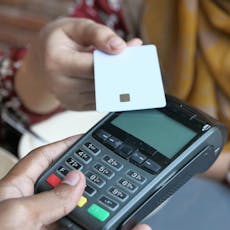Travel credit cards are a clever way to spend abroad; they offer better exchange rates and allow you to avoid any extortionate fees.
See which credit cards you're eligible for
Comparing won’t affect your credit score



By Matt Fernell, Editor at Finance.co.uk.

A travel credit card can be a savvy and convenient way to spend abroad. Here’s how to find the right travel credit card for overseas spending.
We help you find the right travel credit card by checking your eligibility first. This means we will only ever show you the cards you have the best chance of getting.
Compare travel cards from a range of top providers
Get a decision and see deals in minutes
Only see travel credit cards you’re eligible for
Check eligibility with no impact on your credit score
You will see credit cards you’re eligible for side-by-side, allowing you to compare deals easily and choose the right card for you.
To find and compare travel credit cards you’re eligible for, we just need some information about:
Your income: including your annual income, your employment status and when you started your job
Your household: including your homeowner status, address and mortgage contributions
Your personal details: including your name, date of birth, contact details, and dependents
This information allows us to carry out a ‘soft check’ on your credit history. This will leave no mark on your credit report and give us a good understanding of which cards you will be eligible for.
Here’s what to look out for when comparing travel credit cards:
Travel credit cards differ from regular credit cards because they offer no or very low fees for foreign purchases. Check to make sure any card you apply for offers no foreign transaction fees.
Some travel cards also have a monthly or annual fee. Only choose a card with a fee if the benefits outweigh the costs; otherwise, look for a fee-free card.
Also, look at any fees for ATM withdrawals abroad. If you think you will want to take out foreign currency while you’re abroad, look for the cards with the lowest fees for this.
The annual percentage rate (APR) is the interest rate you’ll be charged if you don’t clear your balance every month. If you don’t think you’ll be able to pay off your travel card in full, then look for a card with the lowest APR.
If you leave a balance on your card, the interest can quickly build up, especially if the APR is high. That’s why it’s always a good idea to clear as much of your credit card balance as you can each month.
Some travel credit cards also offer travel-related benefits and rewards if you use them often. For example, you can earn air miles, get travel insurance discounts, or access airport lounges.
Rewards credit cards like this can often have an annual or monthly fee, so it will be most beneficial if you travel frequently.
To be eligible for the best travel credit cards, you will need to have a good credit score. By using our eligibility checker, you can filter out the cards you’re unlikely to get based on your credit history.
When you apply for a new card, a hard search is performed on your credit report. This looks at your credit history in-depth and leaves a mark that other lenders can see.
Too many hard searches on your credit report can damage your credit score, so it’s worth checking your eligibility first to reduce the risk of declined applications.
To get a travel credit card in the UK, you’ll also need to:
Be over 18 or 21 with some providers
Have a permanent address in the UK
Be able to show you can afford to repay the card, i.e. have a steady income
Using a travel credit card is one of the best ways to spend abroad; however, there are other options.
Some challenger banks, new banks with a digital approach, won't charge you fees when you use your account abroad. This can be really useful, especially if you haven't got the best credit rating and cannot get a travel credit card.
Using a debit card from a digital bank account when abroad is more straightforward than using a credit card because it removes the need to repay a balance, making your money easier to manage.
Not all challenger banks will be fee-free, so be sure to check. Many digital banks will also offer near-perfect exchange rates, but make sure yours does before using it aboard.
Although having a card can be safer and more convenient than carrying cash, having some currency when you're abroad can still be helpful, especially if you're travelling to countries where certain credit cards aren't widely accepted.
Always get your foreign travel money before your trip because you'll get the best exchange rates when you order your cash online. You’ll avoid having to pay expensive fees that are common when exchanging currency at the airport.
A prepaid travel card is a card that can be pre-loaded with money before you travel.
They're a great way to avoid taking lots of cash with you, and you can only spend the amount you've pre-loaded onto it, helping you stick to your budget.
One of the main reasons travellers get prepaid travel cards is because the exchange rate is locked in. Every time you purchase or withdraw cash, you'll use the same exchange rate, which won’t fluctuate. Find out more about how prepaid travel cards work here.
There are no fees when using a travel card abroad for spending, compared to 2 or 3% with regular cards
They have one of the best exchange rates when you pay in the local currency, make your money go a little further
They can be safer than carrying around a lot of cash
It's easier to track your spending because you'll be able to see how much you're spending in pounds
Some travel credit cards will reward you with points for flights and discounts on travel insurance
You’ll get section 75 protection, meaning any purchases over £100 will be protected if something goes wrong
They may not be accepted everywhere, so you'll have to consider this before travelling
The exchange rate isn't locked in, so it changes daily, which makes it challenging to know exactly how much you're likely to pay
Your card will come with a credit limit, which could restrict how much you're able to spend while travelling
Some cards charge admin and annual fees, which can increase their cost
If you don’t clear your balance on time, you could face high-interest rates
The information provided does not constitute financial advice, it’s always important to do your own research to ensure a financial product is right for your circumstances. If you’re unsure you should contact an independent financial advisor.
We're on a mission to improve the finances of the nation by helping you to spend wisely and save money



We're on a mission to improve the finances of the nation by helping you to spend wisely and save money



You should always pay in the local currency when using your card aboard.
When paying at a shop, restaurant, hotel, or when withdrawing from a cashpoint overseas, you'll likely be asked if you want to pay in pounds or the local currency when you use your card.
If you pay in pounds, the retailer converts the currency instead of your card provider. As a result, the conversion rates are often poor, leaving you out of pocket.
When you pay in the local currency, your card converts the amount. If you have one of the best travel credit cards, the conversion rate should be unbeatable.
Bad credit is a term used to describe a poor credit history. You'll likely need a fair to good credit rating to get a travel credit card.
To be approved for a travel credit card, you may need to improve your credit rating by taking positive actions to improve your credit report.
Like all other credit cards, travel cards are covered by section 75, no matter where they're used.
Section 75 is a clause in the 1974 Consumer Credit Act that requires your card company to refund the value of any items bought that are faulty, didn't arrive, or breached the terms of service in another way.
Section 75 covers credit card purchases between £100 and £30,000.